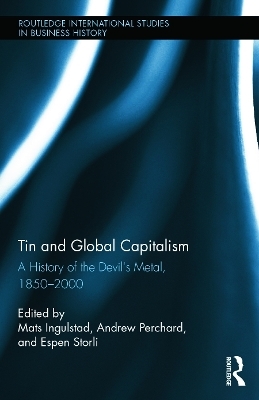
Tin and Global Capitalism, 1850-2000
Routledge (Verlag)
978-0-415-73705-0 (ISBN)
For most of the twentieth century tin was fundamental for both warfare and welfare. The importance of tin is most powerfully represented by the tin can - an invention which created a revolution in food preservation and helped feed both the armies of the great powers and the masses of the new urban society. The trouble with tin was that economically viable deposits of the metal could only be found in a few regions of the world, predominantly in the southern hemisphere, while the main centers of consumption were in the industrialized north. The tin trade was therefore a highly politically charged economy in which states and private enterprise competed and cooperated to assert control over deposits, smelters and markets.
Tin provides a particularly telling illustration of how the interactions of business and governments shape the evolution of the global economic trade; the tin industry has experienced extensive state intervention during times of war, encompasses intense competition and cartelization, and has seen industry centers both thrive and fail in the wake of decolonization. The history of the international tin industry reveals the complex interactions and interdependencies between local actors and international networks, decolonization and globalization, as well as government foreign policies and entrepreneurial tactics. By highlighting the global struggles for control and the constantly shifting economic, geographical and political constellations within one specific industry, this collection of essays brings the state back into business history, and the firm into the history of international relations.
Mats Ingulstad is Postdoctoral Fellow at the Norwegian University of Science and Technology (NTNU), Norway, and co-founder of the History and Strategic Raw Materials Initiative (HSRMI). Andrew Perchard is Lecturer at the University of Strathclyde Business School, UK, and co-founder of the HSRMI. Espen Storli is Associate Professor at NTNU, Norway, and co-founder of HSRMI.
Preface Geoffrey Jones Introduction: "The Path of Civilization is Paved with Tin Cans": The Political Economy of the Global Tin Industry Mats Ingulstad, Andrew Perchard, and Espen Storli 1. Not by Tin Alone: Managing Decline in Cornwall, 1850 – 1920 Roger Burt and Norikazu Kudo 2. Bankers, Entrepreneurs and Bolivian Tin in the International Economy, 1900 – 1932 Oscar Granados 3. Summer’s Food for Winter’s Tables: Tin Consumption in the Americas Joel Wolfe 4. Banging the Tin Drum: The United States and the Quest for Strategic Self-Sufficiency in Tin Mats Ingulstad 5. Tin and the German War Economy: Scrap Drives, Black Markets and Plundering Abroad Jonas Scherner 6. Tin, Tin in the Congo: From Imperial Asset to Conflict Material Alanna O’Malley 7. The Trouble with Tin: Governments and Businesses in Decolonizing Malaya Nick White 8. Trading Tin in an Era of Decolonization Espen Storli 9. Increasing Developing Countries’ Gains from Tin Mining: The Boom Years Prior to the Collapse of the International Tin Agreement John Thoburn 10. "The strategic wolf hidden beneath the clothing of the economic sheep"? Tin and the Strategizing of Raw Materials Andrew Perchard
| Erscheint lt. Verlag | 5.11.2014 |
|---|---|
| Reihe/Serie | Routledge International Studies in Business History |
| Zusatzinfo | 11 Tables, black and white; 11 Line drawings, black and white; 3 Halftones, black and white; 25 Illustrations, black and white |
| Verlagsort | London |
| Sprache | englisch |
| Maße | 152 x 229 mm |
| Gewicht | 544 g |
| Themenwelt | Geschichte ► Teilgebiete der Geschichte ► Wirtschaftsgeschichte |
| Sozialwissenschaften ► Politik / Verwaltung ► Europäische / Internationale Politik | |
| Technik ► Bergbau | |
| Wirtschaft ► Betriebswirtschaft / Management ► Unternehmensführung / Management | |
| ISBN-10 | 0-415-73705-2 / 0415737052 |
| ISBN-13 | 978-0-415-73705-0 / 9780415737050 |
| Zustand | Neuware |
| Informationen gemäß Produktsicherheitsverordnung (GPSR) | |
| Haben Sie eine Frage zum Produkt? |
aus dem Bereich


